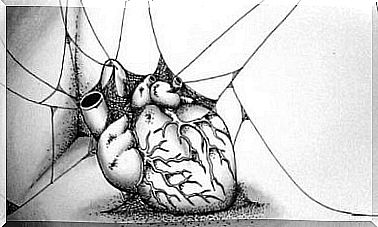Fishing For Empathy: Posting Emotional Problems Online

Fishing for empathy online is a complex behavior that you have probably witnessed on more than one occasion. This is when people post sentences, texts and expressions with worrying and even troublesome emotional content on social media. They say things like, “My life no longer makes sense” or “Nobody cares about me, I feel so alone.”
Sometimes you may think that the person just wants attention when you read these messages. This may be the case. However, experts now place particular emphasis on this type of comment on social media.
How do you know if a person is really asking for help? How can you tell the difference between someone seeking attention and someone really struggling? This is something you might want to pay more attention to.

Fishing for empathy online, the saddest posts online
Some of the new terms used to describe behaviors and situations are easier to remember than others. Fishing for empathy is one of them. It refers to a person who shares feelings and negative thoughts in an online community.
As we mentioned above, you have probably encountered this phenomenon before. If you tend to show interest in it, it will usually be for two reasons:
- First, to learn how other readers judge and handle these messages.
- Second, to find out if the person is really asking for help.
I’m here, give me some attention
In some cases, it is just a call for attention. It’s like a child shouting at an adult. The person will only be heard, and they achieve this by appealing to the adult’s feelings. They do not try to manipulate or deceive. It is a cathartic exercise to seek validation.
In the last year, this phenomenon has increased due to the pandemic and isolation. As we all know, people usually respond with empathy when people play on their emotions.
For that reason, messages like “I’m at the end of it all” or “I feel very sad” are not just attempts to attract attention, but also support. These people want to believe that others feel the same way and that they are not alone.
Young people between 14 and 22 fish mostly for empathy online
If you are in doubt about whether the person just wants attention or really asks for help, it is better to stick to the last option and respond. Because it costs nothing to ask if anyone is well. In fact, you can always contact them privately and ask them to contact you if they want to talk.
Studies conducted by the Department of Pediatrics at Providence St. Joseph Health in Washington state that young people between the ages of 14 and 22 view social media as their only means of contact with others. Therefore, the messages they send tend to be genuine requests for help.
Reply to the messages
The Internet is our window to the world. We have reached the point where the best communication platform is often social media. In fact, many people use social media as a tool to air their thoughts and concerns. For young people, it is their language, channel and refuge. We can not overlook this fact.
In the face of practices such as fishing for empathy, it is extremely difficult to find out what is real and what is not. You should always keep in mind the following:
- It is best to communicate privately with the person and offer your support.
- When replying to messages, do not just give your sympathy. Don’t just click “like” or tell them, “I feel the same way.” Be empathetic either. Try phrases like: “I really regret what you are going through. How can I help? ”

The danger of posting emotions on social media
It’s never a good idea. When you are going through a bad time, it is not appropriate to broadcast it on social media. There are many reasons for this. Everything you say becomes public.
Secondly, there are trolls. People who want to use what you have written against you. They will ridicule and humiliate you. This increases the suffering. Third, remember that not everyone gives good advice.
Some may have good intentions. However, they can tell you something that makes you feel even worse. What you need most at this point is understanding. It is always better for you to get real help from experts.
In the end, we can only repeat what we have already said. Do not ignore messages from those you think may need help. Sometimes the one who needs the most help is the one who makes the least noise, but posts quietly on Twitter or Facebook.







